Column title: Crossed My Mind: Thoughts on Culture and Communication
Column entry: Following Christ “Outside the Camp” (Holy Week)
By John Hatch, Ph.D.
Eastern University (retired)
CCSN Senior Fellow
Column Description: As Christians, we are called to have the mind of Christ. This goes against the grain of our social and cultural conditioning. We seek personal or political advancement; Christ seeks the lost and the least. We grasp for cultural ascendency; Christ descends to the cross of love. This column is dedicated to thinking about culture and communication under the sign of the cross.
April 2023 / March 2023 / February 2023 / January 2023 / December 2022 / November(2) 2022 / November 2022 / October 2022 / August-September 2022 / June-July 2022 / January 2022 / December 2021 / October-November 2021
Following Christ “Outside the Camp” (Holy Week)
Merry: “Who’s side are you on?”
Treebeard: “Side? I am on nobody’s side, because nobody’s on my side.”
~ Lord of the Rings: The Two Towers
During Holy Week, Christians retrace our Lord’s collision course with the powers of his day, culminating in the cross. If we pay attention, we’ll notice that Jesus is much like Treebeard from The Lord of the Rings. Culturally and politically, he’s on nobody’s side; and by the time he is put on trial by the Jewish and Roman authorities, it seems nobody is on his side, including his own disciples. Instead of a side, Jesus identifies himself with the Center, the Source from which the universe springs: “I am.”[i] The gospel of John recounts a number of these “I am” statements; for those who know the Hebrew Bible, this equates Christ with the God of Israel, who had identified himself to Moses as “I am” (Yahweh).[ii] Such a name bespeaks One who can’t be put in a box or relegated to a side.
Throughout Scripture, we repeatedly find that God transcends any pious individual or chosen nation, religious group or political party claiming to represent God and his agenda in the world. For example, when the angel of the Lord appears to Joshua just before his military campaign in Canaan and is asked, “Are you for us or for our enemies?” he answers, “Neither.”[iii] During the corrupt priesthood of Eli and his sons, God allows his own seat of authority on earth (the ark of the covenant) to fall into enemy hands and be removed from Israel for a brief period.[iv] After the nation has grown increasingly corrupt under its kings, God shows that he is not bound to the temple Israel has built for him, eventually abandoning it to plunder and destruction by foreign conquerors.[v]
None of this means that God is indifferent. Though the Creator won’t be anyone’s “genie in a bottle,” he never abandons his creatures. Certainly, God is for all that is good: the beauty and wildness and order of the universe, consummating in human beings made in God’s image, designed to live in loving relationship with the Creator and creation. Moreover, God is on the side of grace, faith, truth, love, justice, and peace. God is with those who are oppressed and forgotten. God is for right understanding of the divine nature; for right worship from a genuine heart; and for compassionate treatment of the poor and needy, the sick and broken, the weak and marginalized. But apart from the incarnate Son of God, no human vessel adequately embodies these concerns.
“I am on nobody’s side,” says Treebeard. Throughout the gospel narratives, Christ refuses to align himself with any of the religious/political parties of his day—Essenes, Zealots, Pharisees, or Sadducees. Even though each of them is, in some way, seeking either to preserve or purify the Jewish nation as God’s representative people on earth, none of them fully aligns with the kingdom that Jesus proclaims and inaugurates. Moreover, he challenges Jewish nationalistic pride wherever he encounters it; welcomes and honors outsiders whose actions demonstrate faith in God; and refuses to demonize Gentile oppressors or condone violence against them—even after the Roman governor knowingly sentences an innocent man—Jesus himself—to death. Christ does not even take his own side; he defends himself neither from false accusation nor unjust crucifixion. His example challenges and humbles all who would claim to have a corner on God—or God’s kingdom.
This makes the path of the Messiah a very lonely one. Beholden to no party or tribe, he has no platform to hide behind, no circle of wagons to take refuge in. And Christ’s followers are called to follow suit—that is, follow him to this lonely place at the margins:
Jesus also suffered outside the city gate to make the people holy through his own blood. Let us, then, go to him outside the camp, bearing the disgrace he bore. For here we do not have an enduring city, but we are looking for the city that is to come. (Hebrews 13:12-14, NIV)
That’s a lot to chew on. For many American Christians, accustomed as we are to equating some version of our nation’s past, present, or future with the cause of Christ, this exhortation should be cause for pause—and critical self-examination. Do we focus more on our nation’s security and geopolitical influence than the coming of Christ’s “upside-down” kingdom—a kingdom marked leading through servanthood, gathering in the marginalized, and lifting up “the least of these”? Do we assume that God is on the side of our political party? Do we assume that our religious affiliation fully reflects the Master’s agenda? Do we conflate our tribe’s ascension to power with Christ’s ascension as Lord? If so, we’ve missed the meaning of Holy Week.
To truly enter into our Lord’s journey to Calvary and beyond, we must learn to let go of our tribal pride, identify with the marginalized, and follow the One who transcends sides. As hard as this is for us, He has paved the way. The incarnate Logos not only gave birth to all creation, he now gives his own life—the wellspring of new creation. Hung on a tree to die, he has in fact proven to be the Tree of Life—his roots buried deep, his branches spreading far and wide on every side.
Christ has died,
Christ has risen,
Christ will come again.
* The views of any CCSN columnists are their own, and do not necessarily represent the views of the CCSN. We invite and embrace a wide range of views and critiques on important communication and cultural issues from a Christian perspective. The CCSN is a community of Jesus followers who study communication. We do not support or promote a particular social, political, or denominational agenda.
Notes
[i] John 8:58.
[ii] Exodus 3:13-14.
[iii] Joshua 5:13-14.
[iv] 1 Samuel 3:11-4:21.
[v] Jeremiah 7:1-15; Jeremiah 52.


